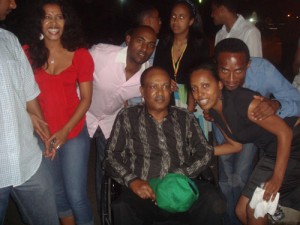Bred in Ethiopia, Raised in America
 The Challenges of Raising Ethiopian Children in America
The Challenges of Raising Ethiopian Children in America
The Ethiopian Diaspora falls under two categories: either the current generation has migrated from their home country or is born abroad. In either case, they are Ethiopians who now live in a country that is foreign to them.
As an immigrant myself, I fall in the first category. I decided to write this article because I realize that almost on a daily basis something reminds me that I come from another country. It could be someone asking me what my name means, carrying a conversation in Amharic with a friend, or someone bluntly asking me what my nationality is. This daily “reminder” made me think some more. I thought about the fact that this “reminder” means that I have blended in, that I am comfortable and yet certain experiences quickly remind me that I have another culture and language I am linked to. I also thought about the journey I took before I was comfortable and the challenges children and parents face while assimilating into a new culture.
After the first year I spent living in the U.S., I remember wanting to go back home. The culture, attitude and expectations of the country did not resonate with me. I could not understand why my family left a comfortable lifestyle in exchange for a complete newness and foreign place. Needless to say, time has persuaded me otherwise.
However, I always thought about the difficulties a family experiences while raising Ethiopian children in
America. Ethiopian children being raised outside of Ethiopia spend their first few years in isolation, embarrassment and loneliness. One of the many name-callings they experience has something to do with the negative image the media has painted about our homeland. Mocking them with harsh words related to drought, hunger, poor, and starvation is sad and all too common. So, in addition to understanding a whole new culture and for most a new language, they are faced to deal with ignorant remarks by their uneducated and unaware peers. Then, through time they build resistance to these comments and have a good handle on the language and the culture. In most cases, they usually don’t experience difficulties in academics. After some time they become Americanized and are comfortable in their own skin. And we can’t blame Ethiopian children for wanting to be more American as being Ethiopian has with it several negative stereotypes. Of course, some parents often deal with the opposite extreme – when their children stop speaking Amharic.
Here is where the parenting gets tricky. Let’s remember that our parents come with their set of “tried-and-true” beliefs, standards and rules that worked in Ethiopia. These rules are forced upon children that are being raised in a different environment, different culture, and different standards and expectations. By the time they have found their niche in this country, they have earned acceptance from their friends by participating in some of the activities their friends take part in. Besides, they spend most of their day at school where they are supervised and taught under American rules and standards. Yet, they come home and are expected to operate under separate regulation. This causes confusion and loss of identity to them while frustrating the parents. In addition to cultural difference, there is generational difference and communication becomes impossible.
I believe the key is not to dismiss all “American behavior” as bad or accept all Ethiopian standards as good. After all, we all migrated to this country because it offers opportunity for growth and a better life, right? Then this country must be doing something right to afford such advantages. We have great cultural values such as respect for our elders, close knit family structure, humble personality and welcoming hearts. These are the very same traits others admire about us and try to learn from us. So why not keep these envied personalities our culture owns while picking up some good habits from others? What’s wrong with a child politely questioning the reason behind a parent’s decision and getting a reasonable answer other than “because I am your mother!”? How about allowing your child to spend some time with his/her trusted non-abesha friend? This is how they build their social lives and become confident individuals.
Growth is not just measured by owning a home or a brand-new car. It is also measured by how much we have grown as a person, by what we learn from living in a foreign country that affords us the opportunity to do better in life and accomplish anything we set out to do. So, my dear Ethiopian people, this is an invitation to reevaluate some of the rules you are holding onto so much and see if they are effective or holding you back, to view things from your children’s perspective and hopefully grow as an individual and as a family.

Average Rating